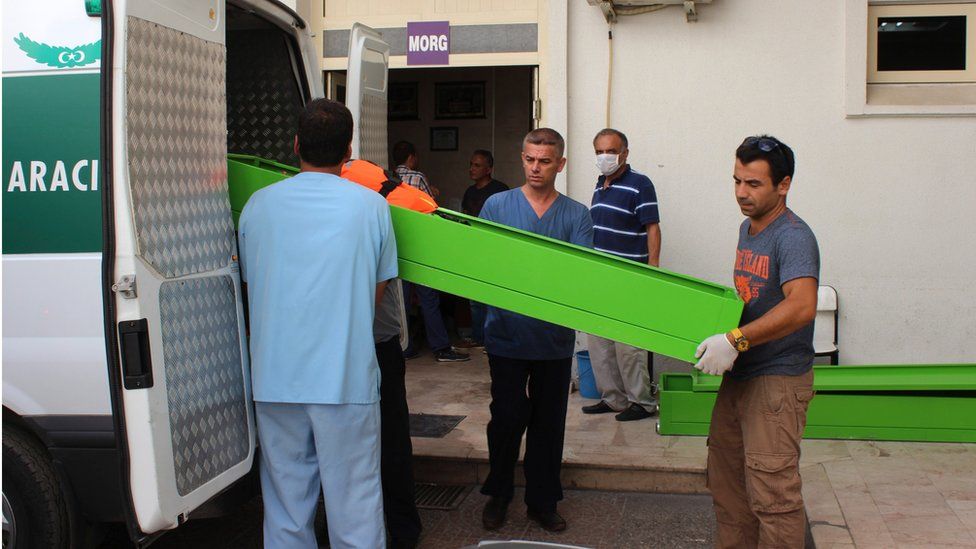Migrant crisis: 17 people drown after boat sinks off Turkish coast
- Published

Seventeen migrants attempting to reach Greece by boat from Turkey have drowned after their boat sank off Turkey.
The victims, all thought to be Syrians, included five women and five children, local media said.
Another 20 people on the boat's deck, who were wearing life jackets, survived, the news agency said.
Some 300,000 migrants and refugees have arrived in Greece so far this year, most of them moving on to try to reach other EU countries.
Those arriving in Greece have mostly set off from Turkey's Aegean coast, according to the International Organisation for Migration.
Those who drowned on Sunday were trapped in the boat's cabin as it sank, Turkey's Dogan news agency reported.
The boat is thought to have set out from the village of Gumusluk near the Turkish resort town of Bodrum, where three-year-old Syrian refugee Alan Kurdi died earlier this month.
Alan's death made international headlines when an image of his body washed up on the beach in Bodrum was widely shared.
With several Greek islands within a few miles, thousands of people are attempting the dangerous journey every day.
Mediterranean rescue
Separately, 500 migrants have been rescued from the Mediterranean so far this weekend in seven operations involving the Italian coastguard and navy and a ship belonging to the charity Medecins Sans Frontieres.
A spokesman for the coastguard told the AFP news agency on Sunday that three of the seven operations were ongoing.
The rescued migrants are thought to be largely from Nigeria, Ghana, Senegal and Sierra Leone and left Libya three days earlier. They were rescued about 80km (50 miles) off the Libyan coast.
Hungarian police said on Sunday that 9,472 migrants had arrived in the country on Saturday, overwhelmingly crossing from Croatia. Hungarian Prime Minister Viktor Orban has said that his government plans to seal its border with Croatia, in the same way that it has sealed the border with Serbia.
Croatia said on Saturday that about 67,000 people had entered the country over the past 10 days, when Hungary's decision to fence off its border with Serbia redirected migrants towards Croatia.
About 10,000 migrants crossed into Croatia from Serbia on Friday - a record daily high - with the steady stream of people continuing into the weekend.
Migrants and refugees crossing the Serbia-Croatia border have suffered a dip in temperatures this weekend.
Orla Guerin: "The journey is getting colder now, and more difficult, but it hasn't stopped the flow of people"
A majority of EU interior ministers last week approved a controversial plan to relocate 120,000 refugees and migrants from Greece and Italy to other member states.
Hungary, Slovakia, Romania and the Czech Republic voted against the proposals.
Read more:
Migrant crisis in Europe: Key recent dates
- 13 July: Hungary starts building razor-wire fence on border with Serbia
- 25 Aug: Germany says all Syrian refugees can apply for asylum there, regardless of which EU country they first entered
- 2 Sept: Image of body of three-year-old Syrian Alan Kurdi, washed ashore in Turkey, moves public opinion worldwide
- 12 Sept: Record 4,330 migrants cross into Hungary
- 13 Sept: In a switch of policy, Germany introduces border controls with Austria - other EU nations later impose their own controls
- 15 Sept: Hungary enforces tough laws on migrants crossing its border fence, prompting thousands to turn to Croatian route
- 18 Sept: Croatia transports migrants over its border into Hungary, which ships them on to Austria
- 19 Sept: Thousands cross into Austria, which prepares to send many on to Germany
A note on terminology: The BBC uses the term migrant to refer to all people on the move who have yet to complete the legal process of claiming asylum. This group includes people fleeing war-torn countries such as Syria, who are likely to be granted refugee status, as well as people who are seeking jobs and better lives, who governments are likely to rule are economic migrants.
Are you in Canakkale? Are you in an area affected by the route of migration? Let us know about your experiences. Email haveyoursay@bbc.co.uk with your stories.
Please include a contact number if you are willing to speak to a BBC journalist. You can also contact us in the following ways:
- Send pictures/video to yourpics@bbc.co.uk
- Upload your pictures / video here
- Tweet: @BBC_HaveYourSay
- Send an SMS or MMS to +44 7624 800 100